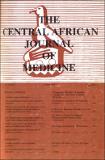| dc.contributor.author | Mbizvo, M.T. | |
| dc.contributor.author | Latif, A.S. | |
| dc.contributor.author | Machekano, R. | |
| dc.contributor.author | MacFarland, W. | |
| dc.contributor.author | Bassett, M.T. | |
| dc.contributor.author | Ray, S. | |
| dc.contributor.author | Katzenstein, D. | |
| dc.coverage.spatial | Zimbabwe. | en |
| dc.date.accessioned | 2016-07-04T10:13:22Z | |
| dc.date.available | 2016-07-04T10:13:22Z | |
| dc.date.issued | 1997-05 | |
| dc.identifier.citation | Mbizvo, M.T. et al., (1997) HIV seroconversion among factory workers in Harare: who is getting newly infected? Central African Journal of Medicine, vol. 43, no. 5, pp. 135-140. Harare: CAJM. | en |
| dc.identifier.issn | 0008-9176 | |
| dc.identifier.uri | https://opendocs.ids.ac.uk/opendocs/handle/20.500.12413/12060 | |
| dc.description | A clinical report on the impact of HIV/AIDS among factory workers in Zimbabwe's industrial areas of Harare. | en |
| dc.description.abstract | It was estimated that by the of 1996 more than 8.4 million AIDS cases had occurred worldwide.1 Because of the long and variable duration between infection with the human immunodeficiency virus (HIV) and the ultimate development of AIDS, a more useful indication of current trends in the epidemic is the number of new infections with HIV.
Twenty eight million people from 190 countries across the world were HIV positive by mid 1996.Composed of distinct epidemics, each with its own features, degree and extent, the pandemic has had a disproportionately severe impact on the developing world. Despite wide information on HIV prevention, 3.1 million new infections occurred during 1996. Up to 93% of the HIV infections recorded in 1996 were from developing countries with 68% from sub-Saharan Africa.2 Developing countries, who have weaker economic structures, continue to bear the greatest burden of HIV infections. HIV infection appears be spreading much faster in Southern Africa than anywhere else. | en |
| dc.language.iso | en | en |
| dc.publisher | Faculty of Medicine, Central African Journal of Medicine (CAJM) University of Zimbabwe (UZ.) | en |
| dc.rights.uri | http://creativecommons.org/licenses/by-nc-nd/3.0/ | en |
| dc.subject | Health | en |
| dc.subject | HIV/AIDS | en |
| dc.subject | Work and Labour | en |
| dc.title | HIV seroconversion among factory workers in Harare: who is getting newly infected? | en |
| dc.type | Article | en |
| dc.rights.holder | University of Zimbabwe (UZ) | en |


